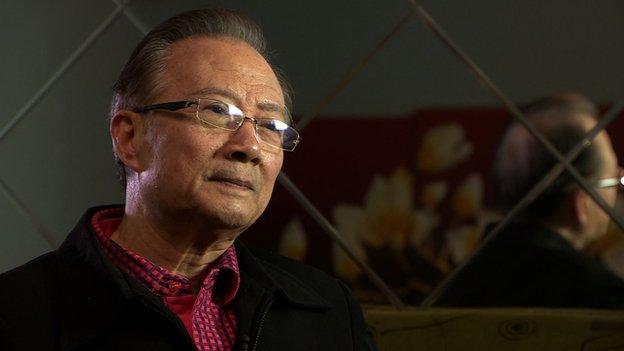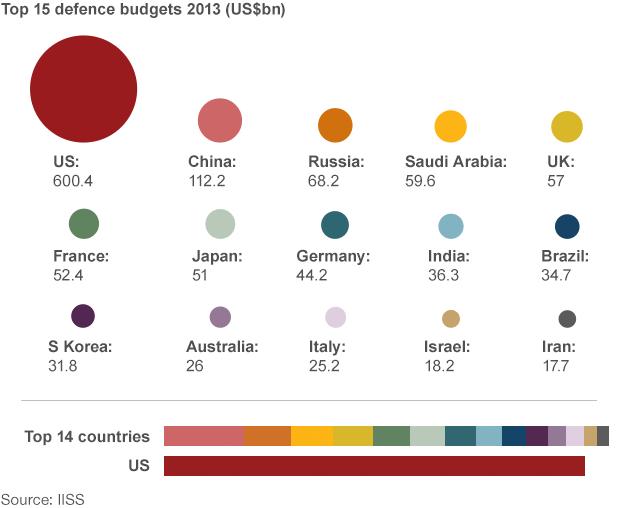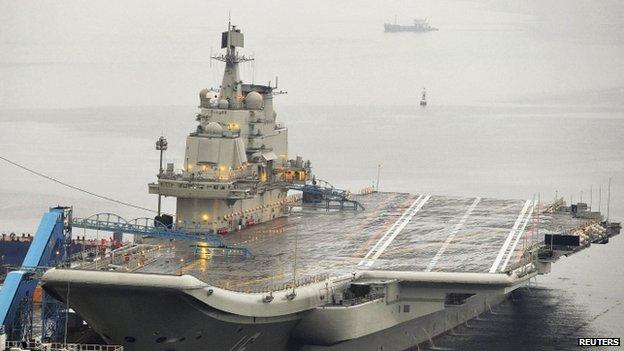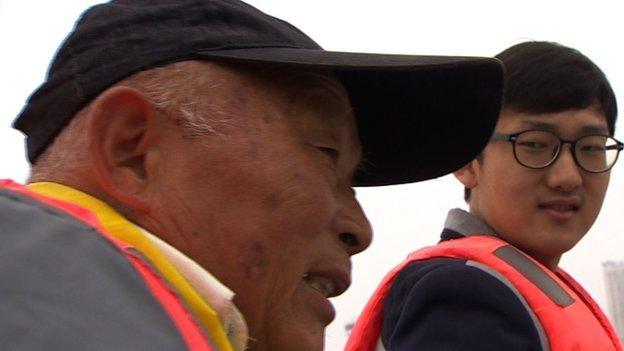Obama Asia tour: China 'the elephant in the room'
- Published
How navy-obsessed is China? The BBC's Carrie Gracie finds out
"No one need fear us because China is a giant herbivore."
So said retired General Xu Guangyu in answer to a question about China's growing military might.
General Xu is 80 and has been with the People's Liberation Army since the age of 16.
Foreign journalists are not allowed into military compounds so we met in a Beijing coffee shop to discuss President Obama's visit to Asia.
Alarming standoff
"Of course an elephant can't turn itself into a rabbit any more than a rabbit can turn itself into an elephant. But the elephant does not eat rabbits. The only danger is that it treads on them."

Gen Xu argues the US would not like it if Chinese forces were deployed on America's doorstep
That is a message for the Philippines with reference to their dispute over a scattering of islands in the South China Sea.
But more alarming is the standoff with Japan over islands in the East China Sea.
In Gen Xu's view, Japan should consider hard demographic realities.
"The Chinese population is 10 times that of Japan, so the Japanese should expect China to be 10 times stronger."
Beijing is not on President Obama's itinerary this week.
Chinese students give their thoughts on US foreign policy
But as he discusses economics and security with allies in Japan, South Korea and the Philippines, China will be very much the elephant in the room and China itself will be watching closely.
The Obama administration has promised what it calls a "pivot to Asia", which in security terms means changing the balance of its forces.
Instead of spreading them 50:50 between the Pacific and the Atlantic, the objective is 60:40 in favour of Asia.
"How would they like it if we took 60% of our forces and sailed up and down in front of their doorstep?" asked Gen Xu.
"We want to achieve parity because we don't want to be bullied. It will take us another 30 years."
The irony in all of this is that since Chairman Mao met President Nixon in 1972, US military dominance in Asia has set the stage for China's rise, providing the security for China to grow rich and strong.

That was then and this is now. With double digit defence spending and a newly assertive tone from President Xi down, China is signalling that it wants a change of the rules and a different map.
In Gen Xu's words: "It's just as Napoleon said. When China wakes it will shake the world. And the Americans can't bear it. We've woken up and we're recovering our might."
Disappointment shared
Another octogenarian meanwhile is in waders and baseball cap, up to his waist in sea water and pushing a 12m (39ft) scale model of an aircraft carrier into the East China Sea.

China's growing naval power is worrying its neighbours

Wen Yuzhun expects his grandson to see a China that is militarily far stronger than it is today
"I built it for my grandson," retiree Wen Yuzhun explains as he hauls a matching model fighter plane onto the deck.
"Qingdao is the home of China's aircraft carrier but we can't get close enough to see it."
I share his disappointment. The People's Liberation Army does not yet do naval facility trips for foreign journalists. The closest I can get to the pride of the Chinese fleet is a chug around the bay on Mr Wen's model.
At 80, he says he won't live long enough to see China become a great sea power, but he hopes his grandson will.
"One aircraft carrier is not enough. Ten aircraft carriers are not enough. Look what's happening now. Japan is bullying China. It sees China as not strong enough and there's nothing we can do about it."
Wen Yuzhun, like Gen Xu, will be listening closely to what President Obama has to say on his Asian tour, alert for warning signs that the US might encourage the territorial claims of China's neighbours.
Along with their government and many of their compatriots, these octogenarians dream of a day when China might be strong enough to enforce its own claims in these seas.